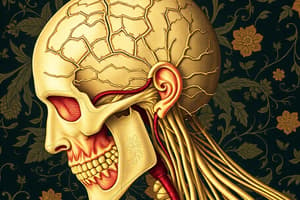Podcast
Questions and Answers
Which cranial nerve provides motor innervation to the tensor veli palatini muscle?
Which cranial nerve provides motor innervation to the tensor veli palatini muscle?
- Vagus (X)
- Hypoglossal (XII)
- Glossopharyngeal (IX)
- Trigeminal (V3) (correct)
The glossopharyngeal nerve is responsible for elevating the soft palate during swallowing.
The glossopharyngeal nerve is responsible for elevating the soft palate during swallowing.
False (B)
What is the primary function of the palatal muscles innervated by the vagus nerve?
What is the primary function of the palatal muscles innervated by the vagus nerve?
To elevate the soft palate and control the uvula during swallowing and speech.
The ________ muscle, innervated by the hypoglossal nerve, is primarily responsible for tongue movements.
The ________ muscle, innervated by the hypoglossal nerve, is primarily responsible for tongue movements.
Match the following cranial nerves with their corresponding muscle innervation:
Match the following cranial nerves with their corresponding muscle innervation:
Which cranial nerve is responsible for providing taste innervation to the anterior two-thirds of the tongue?
Which cranial nerve is responsible for providing taste innervation to the anterior two-thirds of the tongue?
The glossopharyngeal nerve provides taste sensation to both the anterior and posterior portions of the tongue.
The glossopharyngeal nerve provides taste sensation to both the anterior and posterior portions of the tongue.
Which cranial nerve provides general sensory innervation to the hard palate?
Which cranial nerve provides general sensory innervation to the hard palate?
The ________ nerve provides taste innervation to the posterior one-third of the tongue.
The ________ nerve provides taste innervation to the posterior one-third of the tongue.
Match the following regions of the tongue with their respective cranial nerves responsible for taste sensation:
Match the following regions of the tongue with their respective cranial nerves responsible for taste sensation:
Flashcards are hidden until you start studying
Study Notes
Cranial Nerve Innervation
-
Trigeminal Nerve (V3) - Tensor Veli Palatini Muscle
- Innervated by the motor branch of the trigeminal nerve (V3).
- Tenses and stiffens the soft palate during swallowing and speaking.
- Originates from the sphenoid bone and Eustachian tube.
- Inserts onto the hard palate and palatine aponeurosis, aiding in structural support.
-
Glossopharyngeal Nerve (IX) - Stylopharyngeus Muscle
- One of the longitudinal muscles of the pharynx innervated by the glossopharyngeal nerve exclusively.
- Originates from the styloid process and inserts into the pharynx and thyroid cartilage.
- Functions to elevate and expand the pharynx, facilitating the swallowing process.
-
Vagus Nerve (X) - Palatal and Pharyngeal Muscles
- Provides motor innervation to essential palatal muscles including levator veli palatini, palatopharyngeus, and musculus uvulae.
- Responsible for elevating the soft palate, closing off the fauces, and controlling the positioning of the uvula during swallowing.
- Innervates pharyngeal constrictor muscles and the cricopharyngeus muscle for coordinated swallowing and airway protection.
-
Hypoglossal Nerve (XII) - Tongue Muscles
- Motor nerve responsible for the innervation of the tongue muscles.
- Vital for tongue movement which is essential in articulating speech and manipulating food during mastication.
Cranial Nerve Innervation
-
Trigeminal Nerve (V3) - Tensor Veli Palatini Muscle
- Innervated by the motor branch of the trigeminal nerve (V3).
- Tenses and stiffens the soft palate during swallowing and speaking.
- Originates from the sphenoid bone and Eustachian tube.
- Inserts onto the hard palate and palatine aponeurosis, aiding in structural support.
-
Glossopharyngeal Nerve (IX) - Stylopharyngeus Muscle
- One of the longitudinal muscles of the pharynx innervated by the glossopharyngeal nerve exclusively.
- Originates from the styloid process and inserts into the pharynx and thyroid cartilage.
- Functions to elevate and expand the pharynx, facilitating the swallowing process.
-
Vagus Nerve (X) - Palatal and Pharyngeal Muscles
- Provides motor innervation to essential palatal muscles including levator veli palatini, palatopharyngeus, and musculus uvulae.
- Responsible for elevating the soft palate, closing off the fauces, and controlling the positioning of the uvula during swallowing.
- Innervates pharyngeal constrictor muscles and the cricopharyngeus muscle for coordinated swallowing and airway protection.
-
Hypoglossal Nerve (XII) - Tongue Muscles
- Motor nerve responsible for the innervation of the tongue muscles.
- Vital for tongue movement which is essential in articulating speech and manipulating food during mastication.
Sensory Innervation Overview
- Sensory innervation is crucial for detecting various sensations, including general sensory and taste functions.
General Sensory Innervation
- Trigeminal Nerve (V2): Responsible for sensation in the hard palate and the upper row of teeth.
- Trigeminal Nerve (V3): Innervates the front of the tongue and the oral cavity, providing general sensory feedback.
- Glossopharyngeal Nerve (IX) and Vagus Nerve (X): Together, they provide general sensory innervation to the pharynx.
Taste Innervation
- Facial Nerve (VII): Supplies taste sensation to the anterior two-thirds of the tongue via the chorda tympani branch; detects flavors such as sweet, sour, salty, and bitter.
- The facial nerve uses the lingual nerve (from the trigeminal nerve) to access the anterior region of the tongue.
- Glossopharyngeal Nerve (IX): Innervates the posterior one-third of the tongue for taste perception; also provides general sensory innervation to the same region.
Studying That Suits You
Use AI to generate personalized quizzes and flashcards to suit your learning preferences.




